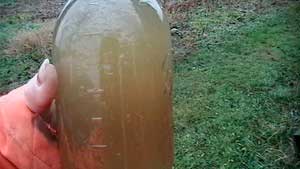Contains the keyword press
Philadelphia Enquirer editorial. Published: Mar. 22, 2010.
...Representatives of the Marcellus Shale Coalition, an industry trade group, point out that not a single case of groundwater contamination has been linked to their drilling technique, called hydraulic fracturing or "fracking."
It involves pumping up to three million gallons of water (per well), combined with sand and chemicals, more than a mile underground to shatter the rock and release the gas.
But fracking does carry potential risks to the environment. Those concerns are causing government officials elsewhere to proceed cautiously on Marcellus drilling. New York state has imposed a moratorium on Marcellus wells until it completes an environmental-impact assessment.
Let us see if we have this right: The tap water is bubbling in Parker County, carbonated with enough natural gas to make it as flammable as a French Quarter cocktail and as explosive as a hand grenade, and the Texas Railroad Commission — consulting its Advent calendar, no doubt — has scheduled a hearing on the matter for Jan. 10.
No need to spoil the holidays with unpleasant decision-making; we’ll just let that gas keep percolating until next month, and hope we don’t get a big boom west of Fort Worth to ring in the new year.
If you haven’t been reading the recent accounts in the paper, here is what’s been going on in Parker County: Residents there reported that their tap water was bubbling. The federal Environmental Protection Agency did tests and determined that the water was contaminated enough by gas to create an imminent threat of fire or explosion. The EPA turned its results over to the railroad commission, which decided to hold a meeting...
See: Bluedaze. "Shale Survival Tools and Medical Information."
See: Sharon Wilson. Dec. 20, 2010. Earth Blog. "EPA's Xmas present to Texas families with drinking water polluted by drilling: cleaner water".
See: Argyle-Bartonville Communities Alliance. Dec. 14, 2010. "Keep Track and Speak Up."
--Editors: Flynn McRoberts, Susan Warren
This article examines the lawsuit against Exxon filed by Texas rancher Elizabeth Burns.
See: Rancho Los Malulos | A satirical view from the McGill Brothers Lease
Oil’s ‘Ugly Side’
“This isn’t something the states are proud to advertise,” said Philip Dellinger, chief of the groundwater section in the Austin, Texas, office of the Environmental Protection Agency. “It’s the ugly side of the oil and gas business.”
The EPA says it has no authority to force companies to address contamination on active fields and must defer to Texas regulators, who let oil companies determine if sites need cleanup.
...Pollution from decades-old wells and waste pits isn’t isolated to their ranch or Exxon. There are more than 100,000 old wells in Texas that haven’t been capped and thousands of defunct gas-processing plants, compressor stations and related equipment that have never been dismantled, according to the Texas Land and Minerals Owners Association, which represents 1,200 ranchers, farmers and individuals who own stakes in oil and gas fields.
Contamination Migrates
The contamination may have migrated from a defunct oilfield on the north end of town, where sludge and other waste from wells was dumped in open dirt pits for decades, said J.T. Garcia, president of the Duval County Conservation and Reclamation District. He doesn’t know who operated the field, which stopped pumping crude in the 1970s.
The Burns’s ranch, which covers an area equal to the size of Brooklyn, is just one example of the lingering environmental damage across swaths of south, west and east Texas from what were once regarded as acceptable oilfield practices, said Patterson, the commissioner with the Texas General Land Office, which oversees oil leases that help fund the state’s schools and universities.

Mrs. Burns | Photo by Sharon Wilson
“They’d just dig a pit and put the oil in it and then they’d haul it off later, or maybe they wouldn’t haul it off later, depending on the price of oil at the time,” said Patterson. “That was the norm, and nobody said anything about it.”
...Although lighter-weight hydrocarbons can degrade naturally in 40 or 50 years, the heavier molecules “are more persistent and pretty toxic,” said Gregory Miller, project manager at Icon Environmental Services Inc., a Port Allen, Louisiana-based company that cleans up old oilfields. “You have no idea how bad some of these sites are.”
Daunting Task
Patterson said cleaning up a tract as large as the Encinitos Ranch is impossible. Instead, the best solution may be to fence it off and monitor the pollution to ensure it doesn’t migrate underground to other ranches...
...“Exxon’s walked away from a lot of this stuff they built here, but the evil lurks,” said Burns, who had planned to raise organic vegetables when she and her husband moved to the ranch with their sons five years ago. “You’d hope your kids can do something with this land, but now it’s worthless.”
According to the Environmental Working Group, a research and advocacy group based in Washington, drilling companies are side-stepping a permitting requirement for the use of diesel fuel in their fracturing fluids by using similar petroleum distillates that contain the same toxins as diesel, but require no permitting.
The report also cites evidence that drilling companies continue to inject diesel fuel underground without the proper permits.
Includes public comments.
Natural gas companies are wasting no time before attempting to sway a Fort Worth air quality study in their favor.
As a City Hall-named committee charged with designing the study began its discussions Wednesday, representatives of Chesapeake Energy, Devon Energy and XTO Energy insisted that any findings of contaminated air around natural gas facilities be examined "in context."
That's how the gas industry's PR machine tries to deflect any blame for poisonous air. The argument goes like this:
Well, yes, benzene causes cancer. And yes, benzene is one of the hazardous chemicals that can be brought to the surface and escape into the air as a result of natural gas drilling and related activities. But measurable levels of benzene can also come from many other sources, like the gasoline station down the street or the road paving project two blocks away. You can't blame it all on us.
That's good spin, just enough truth in it to throw the gullible off guard.
A boom in natural-gas drilling in Pennsylvania could bring millions of barrels of salty toxic waste into Ohio.
That's a warning Ohio's oil and gas industry and environmentalists are sounding as hundreds of deep wells are drilled into Marcellus shale.
Tom Stewart, vice president of the Ohio Oil and Gas Association, and Jack Shaner, lobbyist for the Ohio Environmental Council, predict that Pennsylvania companies will soon truck their well wastes to Ohio, where brine is injected into 159 privately owned, state-regulated disposal wells. It is illegal to dump brine in Ohio streams and rivers.
Stewart said, "I have a big problem that that (well) capacity isn't overloaded by out-of-state water."
Shaner said, "We're looking at a wave of toxic brine headed into this state."
That's why both support a bill in the Ohio legislature that would create a 20-cent-per-barrel disposal tax on brine shipped in from other states. That's four times as much as a proposed 5-cent-per-barrel tax on Ohio brine.
Will the boom in natural gas drilling contaminate America's water supply?
This week, NOW (PBS) talks with filmmaker Josh Fox about "Gasland", his Sundance award-winning documentary on the surprising consequences of natural gas drilling. Fox's film—inspired when the gas company came to his hometown—alleges chronic illness, animal-killing toxic waste, disastrous explosions, and regulatory missteps.
See: Backlash: The Smear Campaign. Immediately upon the film's release, Energy In Depth issued a paper claiming to "debunk" the film's documentary evidence.
See: Mike Hale. The New York Times. June 21, 2010. The Costs of Natural Gas, Including Flaming Water.
Dave Shiflett. Bloomberg.com. June 21, 2010. Cook a Hamburger and Blow Up Your Polluted Fracking Town.
See: DEC Fracks NYC & Josh Fox of Water Under Attack's Responds
See also: Gasland Trailer 2010.
See: Drilling Isn't Safe.
Fear about environmental damage from Marcellus Shale natural gas drilling is often trained on what could happen deep underground, but some of the gravest hazards posed by the process are driven in trucks, stored in tanks, carried through hoses and left in surface pits at natural gas well sites.
Concentrated chemicals, as well as wastewater containing toxic levels of salts and metals, are stored, produced or transported in large quantities at each well site, creating the potential for tainting drinking water or seeping into ponds and streams.
While recent enforcement action against Cabot Oil and Gas Corp. - the company deemed responsible for methane leaks and nearly two dozen spills in Susquehanna County in the last two years - has drawn attention to the danger of spills, information about the industry-wide frequency and impact has not been reported publicly.
See: Cabot Oil & Gas’s Marcellus Drilling to Slow After PA Environment Officials Order Wells Closed, Lustgarten, Abrahm . ProPublica. (2010.
See: Commonwealth of Pennsylvania DEP takes aggressive enforcement action against Cabot Oil.

















